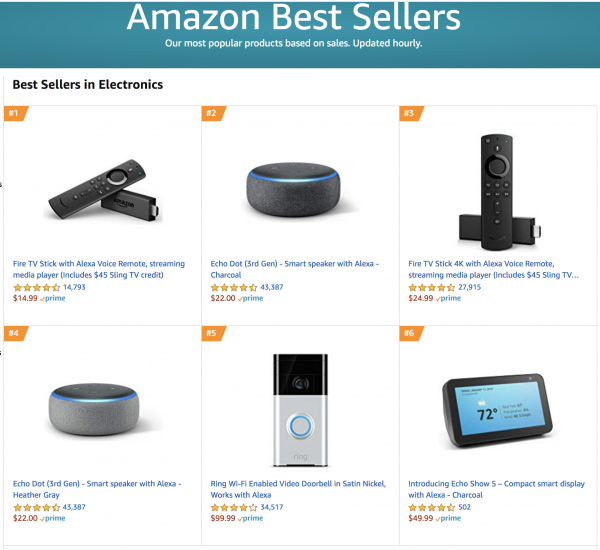
This story is part of a group of stories called

Uncovering and explaining how our digital world is changing — and changing us.
Many more American homes will have surveillance devices after this year’s Amazon Prime Day sale.
As a promotion during its 36-hour Prime shopping event, the e-commerce giant is selling its Ring video doorbell and other Ring surveillance products at steep discounts — about 50 percent off, depending on the package. After the first day of Prime sales, Amazon’s Ring doorbell was a bestseller among Amazon devices and electronics overall on what has historically been the company’s biggest sales day.
Quite like how Amazon’s killer Prime Day deals on Echo smart speakers have encouraged people to put more than 100 million artificially intelligent Alexa devices in their homes, the company’s push to sell Ring devices could lead to a more widespread embrace of what I’ve referred to as fear-based social media.
Ring, and its attendant app, Neighbors, let people in a given community report crimes and share footage of those crimes — often people stealing Amazon packages — that they collect via their Amazon Ring video cameras. In practice, that means a lot of reports of “suspicious” brown people on porches and a general perception that the world is a scarier place than it is.
At Fortune’s Brainstorm Tech conference Monday, Ring founder Jamie Siminoff responded to criticism that Ring products spread racism and paranoia by touting the company’s “moderators with extensive training” and community guidelines that prohibit racial profiling and discrimination.
Even after being bought out in 2018 by Amazon, he thinks these practices are working. “I do believe we’re scaling properly with this,” he said.
But people of color are still disproportionally featured in Ring videos of “crimes,” and racist language describing alleged criminals is commonplace, especially in the comments on the Neighbors app. Ring and Neighbors users are also encouraged to share the videos with law enforcement, a practice that can exacerbate dangerous interactions with police among people of color.
As Steven Renderos, senior campaigns director at the Center for Media Justice, previously told me, “These apps are not the definitive guides to crime in a neighborhood — it is merely a reflection of people’s own bias, which criminalizes people of color, the unhoused, and other marginalized communities.”
It’s also bad for the mental health of the people who own the devices.
Since these apps focus on crime nearby, it can feel like there’s more imminent danger than there really is. Indeed, Americans perceive crime to be going up even as national statistics from the FBI and the Bureau of Justice Statistics show crime rates are declining.
Earlier this month, Vice reported on an Amazon PR stunt in which the company collaborated with police departments to set up useless sting operations to catch people stealing Amazon goods.
In the end, it only really helped Amazon.
“If customers fear their neighbors, and fear they might steal a package, customers are less likely to be mad at Amazon if they don’t get a package they ordered,” Vice reporter Caroline Haskins wrote. “They’re also more likely to buy an Amazon-owned Ring doorbell camera, which is marketed as a way of surveilling your stoop for package deliveries and package thieves.”
But that hasn’t stopped fear-based social media from becoming very popular.
Ring’s Neighbors app, along with Citizen — an app that functions like a police scanner and encourages people to film and share nearby crime scenes — and Nextdoor — a general neighborhood social network where people can sell goods, ask for local recommendations, or discuss neighborhood crime — are hits on app stores, according to data from mobile data and analytics provider App Annie. Note in the following chart that Ring’s app is classified as social media, while Nextdoor switched its category in May from social to news, and Citizen considers itself news. The social category is much more competitive, according to App Annie, because it also includes the likes of Facebook, Snap, and Instagram, which have millions, if not billions, of users.
Ahead of Prime Day, Neighbors was the 23rd most-downloaded social app on iOS.
Amazon has been leaning heavily into surveillance tech lately, but as Medium’s Will Oremus recently wrote, the company is simultaneously “disclaiming responsibility for how its technology is used, and dismissing concerns raised by academics, the media, politicians, and its own employees.”
Indeed, earlier this year at Recode’s Code Conference, Amazon Web Services CEO Andy Jassy likened the company’s controversial facial recognition tech, Rekognition, to any other tool, like a knife, that could be used for ill. (A Ring spokesperson told Recode that it does not use facial recognition technology, nor does it work with Rekognition.)
“Just because tech could be misused doesn’t mean we should ban it and condemn it,” Jassy said.
Similarly, Ring products can be used for good and bad. After Prime Day, we’re going to have a lot more options for both.
Recode and Vox have joined forces to uncover and explain how our digital world is changing — and changing us. Subscribe to Recode podcasts to hear Kara Swisher and Peter Kafka lead the tough conversations the technology industry needs today.
Sourse: vox.com






